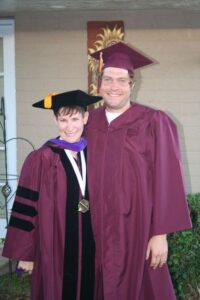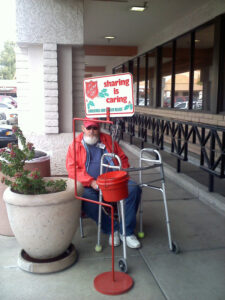It’s been quite an eventful busy year. Thank you to all my family and friends who supported me through this year, even during my moments of pure stressed out insanity. Here are my top five events and experiences of 2011.

- I Passed The Bar! The process of graduating from law school, studying for, taking, and passing the Arizona Bar Exam and the process of applying and being admitted to the State Bar of Arizona took about 7 months of my year. It was exceptionally stressful – easily the hardest thing I’ve done in my professional life. It was a huge relief when I learned that I passed the Bar and Character and Fitness.
- Personal Record at the Half Marathon Injuries prevented me from training the way I would have liked for the 2011 Rock ‘n’ Roll Marathon in Arizona. Despite being in pain starting at mile 2, I had the same rule for this race as my previous half marathon – no stopping or walking. Around mile 9, I realized that I was close to being on pace for a personal record, so I kicked my speed and finished 3 minutes faster than the previous year.  I was in so much pain by the end of the race, but it was an incredible lesson in determination.
 Sponsor A Law Kid I succeeded in getting my blog sponsored for 46 days during the beginning of the year to offset the cost of my last semester of law school. It was a challenge to create quality content every day and to face the backlash from some members of the legal community. I love that I was able to do this. My only regret is not doing it sooner.
Sponsor A Law Kid I succeeded in getting my blog sponsored for 46 days during the beginning of the year to offset the cost of my last semester of law school. It was a challenge to create quality content every day and to face the backlash from some members of the legal community. I love that I was able to do this. My only regret is not doing it sooner.- I Wish Your Wish One of the most powerful experiences this year was attending Rivane Neuenschwander’s I Wish Your Wish exhibit. It took me down to my core level and connected me with what I want for my life. For over two months, I had a pink ribbon tied around my wrist that said “I Wish To Die With No Regrets.â€
-

Photo by Jamey Peachy Big Brain Award Nomination I was shocked and overjoyed when I learned that I was nominated for a New Times Big Brain Award for my work behind the scenes with Improv AZ, the flash mob/prank troupe I co-founded in Phoenix. Ever since I expressed interest in flash mob law, I questioned whether it was a viable area of law. Just being nominated validated my professional aspirations and showed me that there is a need for the work I’m interested in.
Celebrity Encounters in 2011:
 Captain Keith Colburn – captain of F/V Wizard on Deadliest Catch
Captain Keith Colburn – captain of F/V Wizard on Deadliest Catch- Jason Sadler – founder of I Wear Your Shirt
- Caleb Laieski – teen LBGT lobbyist in Washington DC
- Carey Pena – co-anchor of 3TV News in Phoenix
- Pam Slim – author of Escape From Cubicle Nation
- Amber Naslund and Jay Baer – authors of Now Revolution
Firsts in 2011:
-

Photo by Jeff Moriarty - First retail job
- First Kindle
- First fake protest
- First Warrior Dash
- First KT Tape
- First Food Truck Friday
- First paid blogging job
- First (and hopefully last) bar exam



